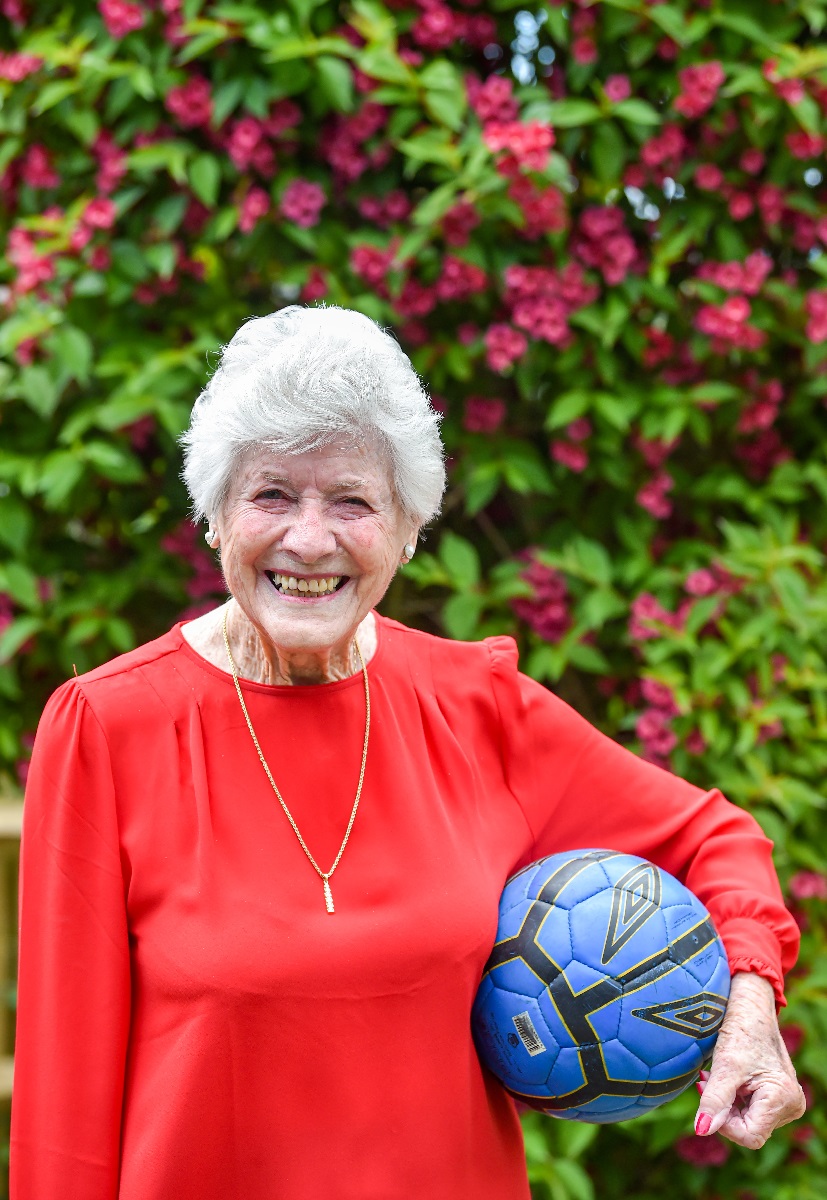Goal Power! An Exhibition Legacy: Audio

Have a listen to stories of those who revived women’s football in the 1960s and 70s, young players who are pushing for girls to play today, and to fans who came to Brighton to watch the UEFA Women’s EURO in 2022.
Brighton Player Stories
Goal Power Curator Jody East and interviewer Charlotte Petts took a road trip with a group of players from Brighton teams of the past. We visited the new Brighton & Hove Women’s Elite Academy and watched the current women’s team play a match at Crawley stadium.
Listen to snippets of memories, experiences and a whole lot of laughter from these interviews. (Excuse the sounds of the coach!)
Ali and Chris
Angie
Anne
Janet
Jo
Mary

Young Players Interviews
As part of the Goal Power! exhibition programme Brighton Museum invited young women, with a passion for football, to take part in an exciting creative project.
In April 2022, a group of seven young female footballers spent a week at the Museum collaborating with a range of heritage, sports and creative experts to investigate the history of women’s football, share personal stories and explore how football can change people’s lives.
Caitlin, Bo, Lili, Olivia, Verity, Marta and Rosa worked with museum curators to explore personal objects, a graffiti artist to create ‘Call to Action’ placards, professional photographers to produce studio portraits and audio producers to record podcasts.
The series of podcasts they produced can be listened to via the links below. They interview some of the pioneers in women’s football featured in the Goal Power! exhibition and members of Lewes FC.
The group also interviewed each other capturing a record of what football is like for girls aged 12-14 living in Sussex in 2022.
Former Brighton & Hove Albion player Eileen Bourne chats with Bo and Rosa
German champion Petra Landers chats with Caitlin and Lili
Referee Georgia Rooney chats with Marta and Olivia
The team behind Lewes FC chat with our Young Players
Karen chats to Bo and Caitlin about her own learning curve, the power of women’s football and the rising tide of equality.
Rhian chats to Bo and Rosa about her journey to becoming Captain for Lewes FC and asks them about their own ambitions for the future.
Ellie chats to Marta and Olivia about the challenges, changes and joy she’s experienced in women’s football and her growing passion for coaching.
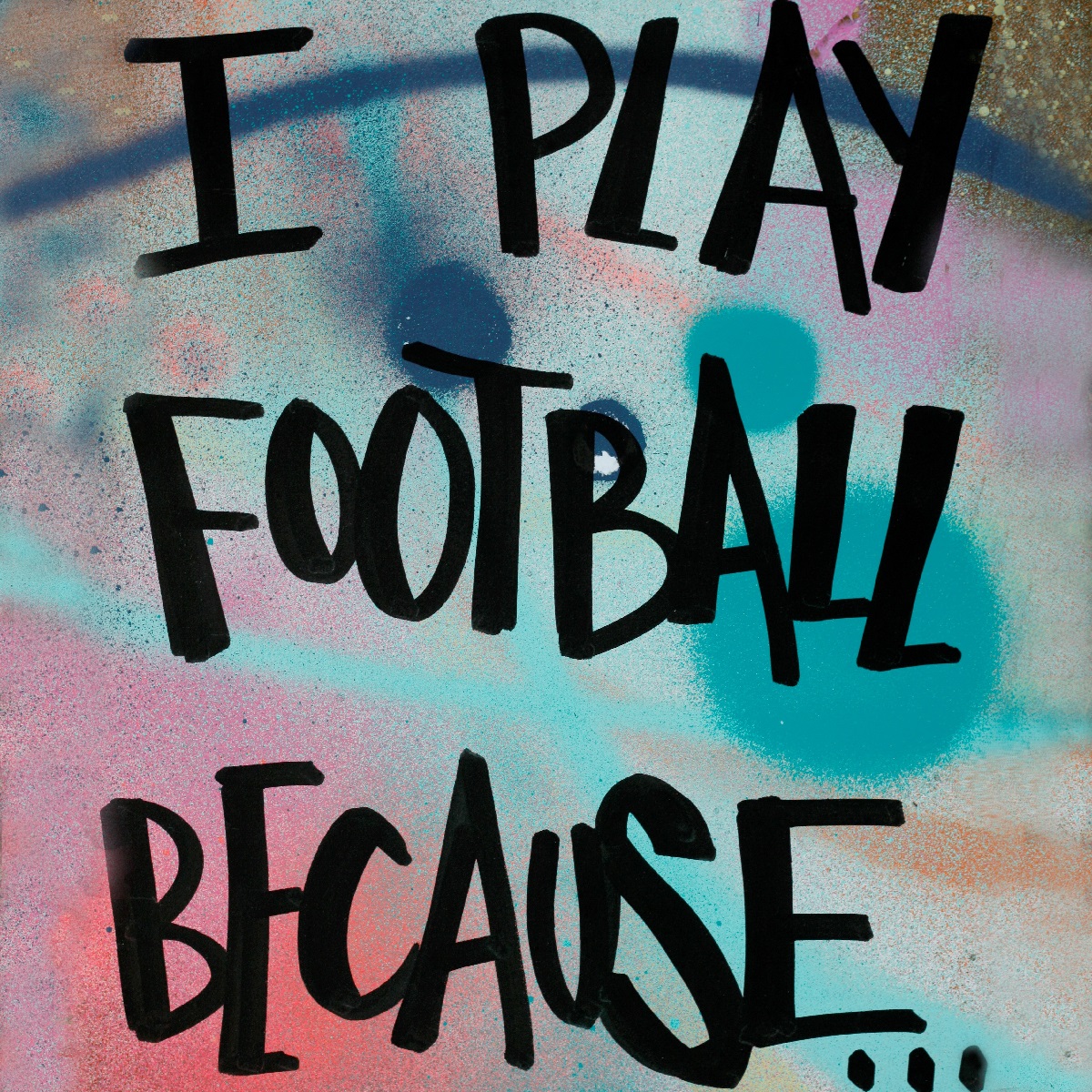
I play football because….
To celebrate UEFA Women’s EURO 2022 tournament we asked exhibition visitors and people at Brighton & Hove’s Fan Party why they play football and why it is important to them.
With thanks to Audio Producer Charlotte Petts, Artist Facilitator Lindsey Smith and Youth Advocate Priority 1-54.
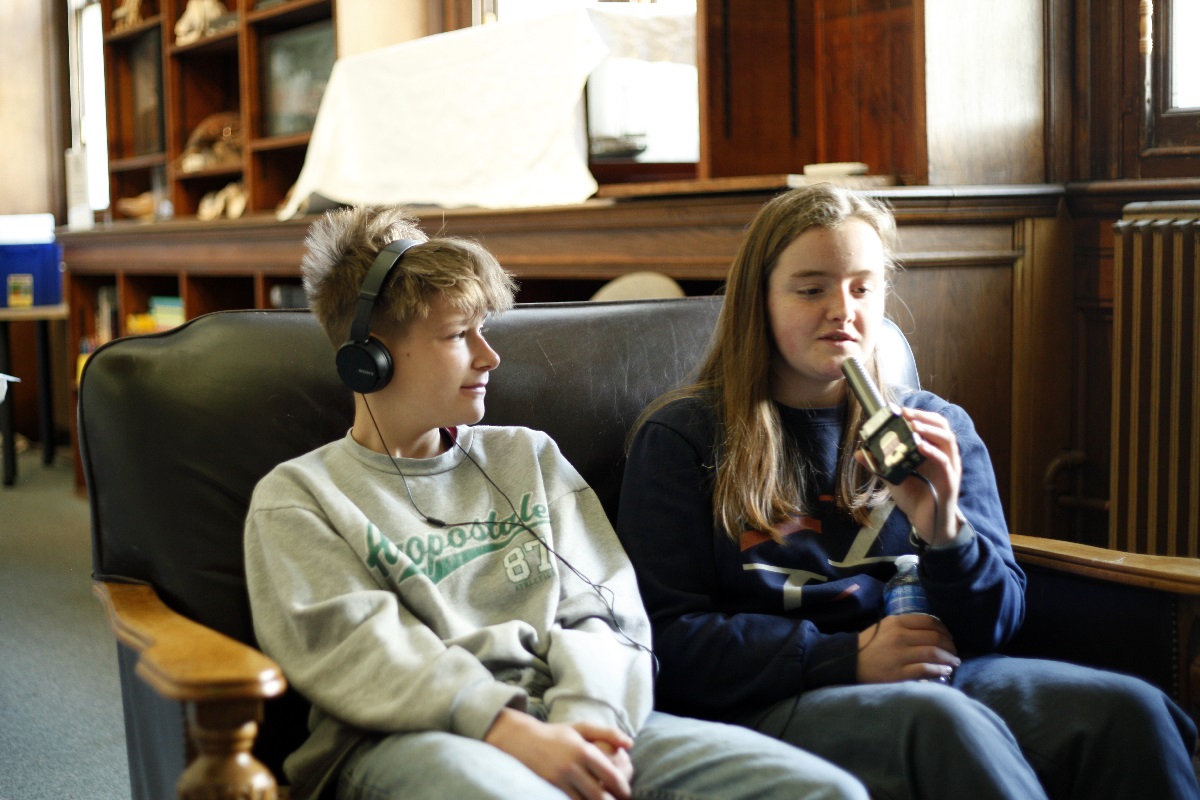
Womansplaining Football podcast
As part of the Goal Power! exhibition programme three young women, with a passion for football, collaborated with audio producer Charlotte Petts to create their own podcast.
Episode 1: July 2022
In the lead up to the final match of the UEFA Women’s Euro in July 2022 Verity, Marta and Rosa discuss the stigma behind women’s football, the growth of the game, their experiences as young footballers and their thoughts on female football today:
Episode 2: September 2022
In the second episode of Womansplaining Football Verity, Marta and Rosa consider the past, present and future; the impact of the UEFA Women’s Euro win, current news and controversy and looking forward to the 2023 FIFA Women’s World Cup, and beyond, they discuss funding, access and advocacy for the women’s game:
With thanks to National Heritage Lottery Funding for believing in this project and Lindsey Smith, arts facilitator and youth advocate.
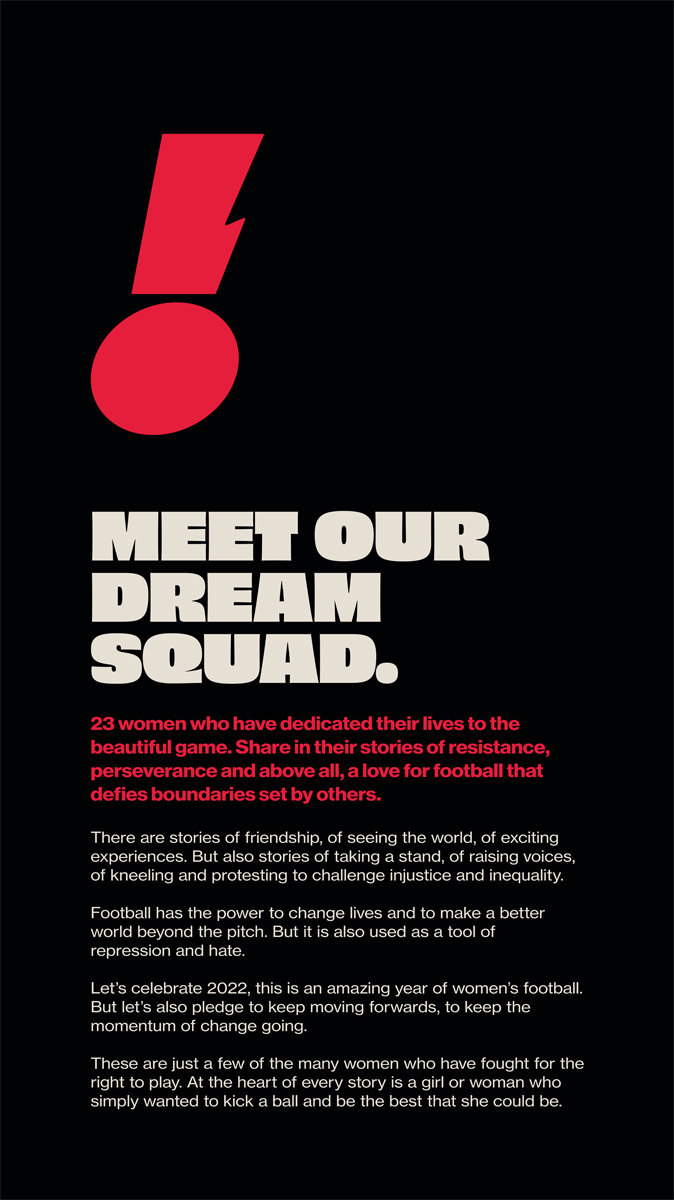
Text panel audio: Meet our Dream Squad
23 women who have dedicated their lives to the beautiful game. Share in their stories of resistance, perseverance and above all, a love for football that defies boundaries set by others.
There are stories of friendship, of seeing the world, of exciting experiences. But also stories of taking a stand, of raising voices, of kneeling and protesting to challenge injustice and inequality.
Football has the power to change lives and to make a better world beyond the pitch. But it is also used as a tool of repression and hate.
Let’s celebrate 2022, this is an amazing year of women’s football. But let’s also pledge to keep moving forwards, to keep the momentum of change going.
These are just a few of the many women who have fought for the right to play. At the heart of every story is a girl or woman who simply wanted to kick a ball and be the best that she could be.
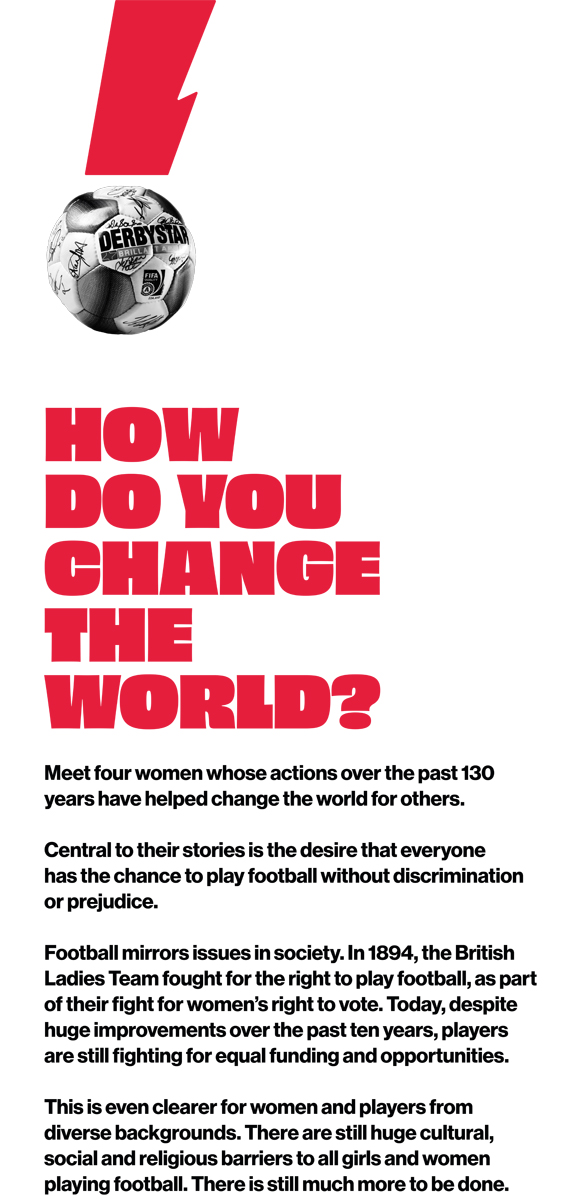
Text panel audio: How do you Change the World?
Meet four women whose actions over the past 130 years have helped change the world for others. Central to their stories is the desire that everyone has the chance to play football without discrimination or prejudice.
Football mirrors issues in society. In 1894, the British Ladies Team fought for the right to play football, as part of their fight for women’s right to vote. Today, despite huge improvements over the past ten years, players are still fighting for equal funding and opportunities.
This is even clearer for women and players from diverse backgrounds. There are still huge cultural, social and religious barriers to all girls and women playing football.
There is still much more to be done.
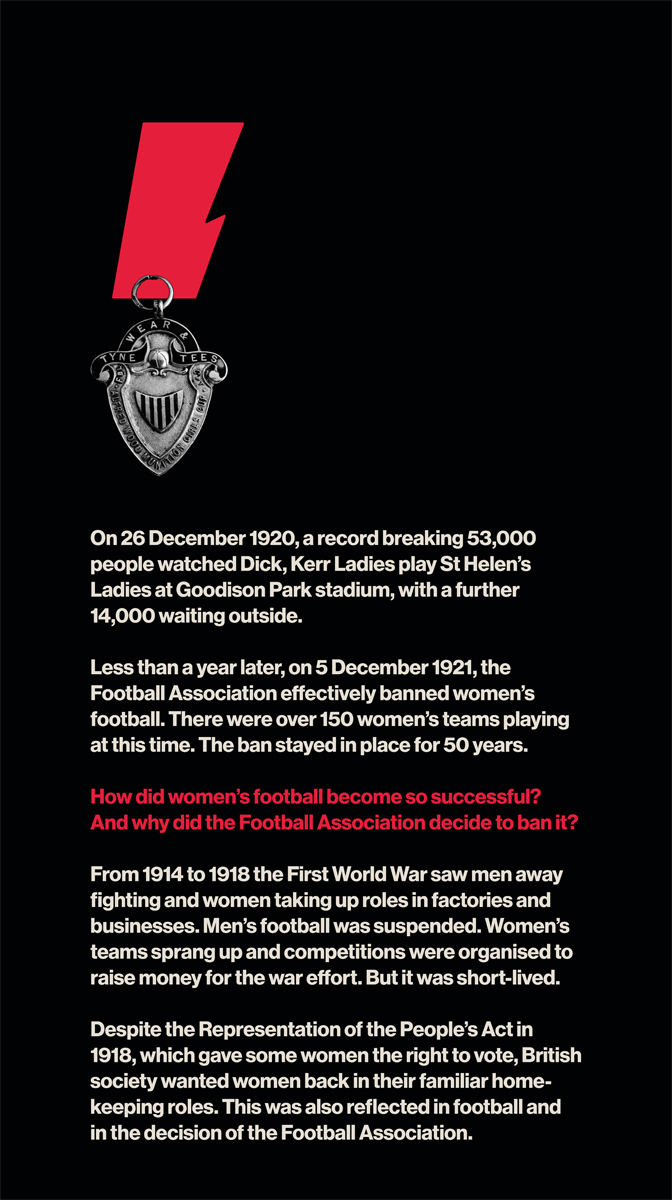
Text panel audio: Women Hold up Half the Sky
On 26 December 1920, a record breaking 53,000 people watched Dick Kerr Ladies play St Helen’s Ladies at Goodison Park stadium, with a further 14,000 waiting outside.
Less than a year later, on 5 December 1921, the Football Association effectively banned women’s football. There were over 150 women’s teams playing at this time. The ban stayed in place for 50 years.
How did women’s football become so successful? And why did the Football Association decide to ban it?
From 1914 to 1918 the First World War saw men away fighting and women taking up roles in factories and businesses. Men’s football was suspended. Women’s teams sprang up and competitions were organised to raise money for the war effort. But it was short-lived.
Despite the Representation of the People’s Act in 1918, which gave some women the right to vote, British society wanted women back in their familiar home-keeping roles. This was also reflected in football and in the decision of the Football Association
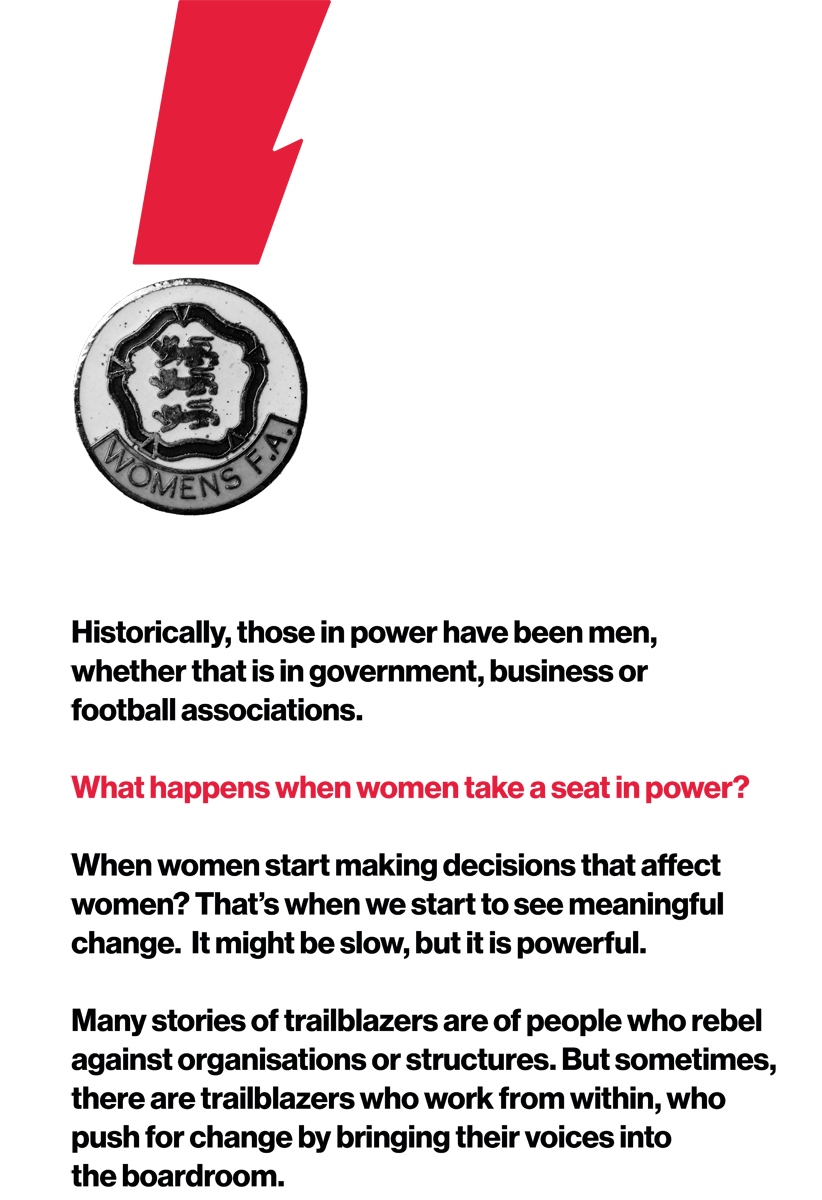
Text panel audio: If They Don’t Give You a Seat at the Table – Bring a Folding Chair
Historically, those in power have been men, whether that is in government, business or football associations.
What happens when women take a seat in power? When women start making decisions that affect women? That’s when we start to see meaningful change. It might be slow, but it is powerful.
Many stories of trailblazers are of people who rebel against organisations or structures. But sometimes, there are trailblazers who work from within, who push for change by bringing their voices into the boardroom.

Text panel audio: Well Behaved Women Seldom make History
FIFA World Cup France 2019 is seen as a turning point in women’s football, with record breaking viewing figures and footballers such as Megan Rapinoe becoming household names.
Yet there are extraordinary stories from long before this, women who played on the international stage, yet were silenced or ignored in their home countries. By breaking the rules or challenging the footballing authorities they went to World Cups, played professionally, and won trophies.
For those of us who wondered where our role models were growing up, here they are. These
are women whose posters should have been on our bedroom walls.
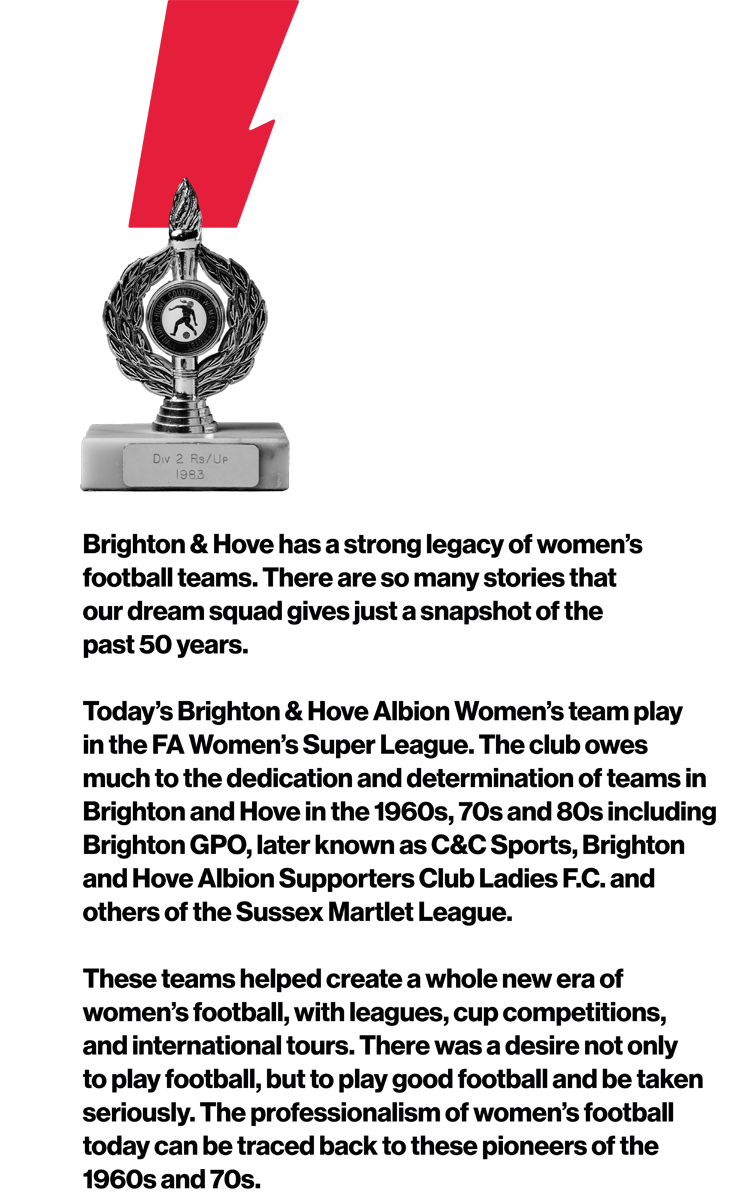
Text panel audio: A Woman’s Place is… on a Football Pitch
Brighton & Hove has a strong legacy of women’s football teams. There are so many stories that our dream squad gives just a snapshot of the past 50 years.
Today’s Brighton & Hove Albion Women’s team play in the FA Women’s Super League. The club owes much to the dedication and determination of teams in Brighton and Hove in the 1960s, 70s and 80s including Brighton GPO, later known as C&C Sports, Brighton and Hove Albion Supporters Club Ladies F.C. and others of the Sussex Martlet League.
These teams helped create a whole new era of women’s football, with leagues, cup competitions, and international tours. There was a desire not only to play football, but to play good football and be taken seriously. The professionalism of women’s football today can be traced back to these pioneers of the 1960s and 70s.
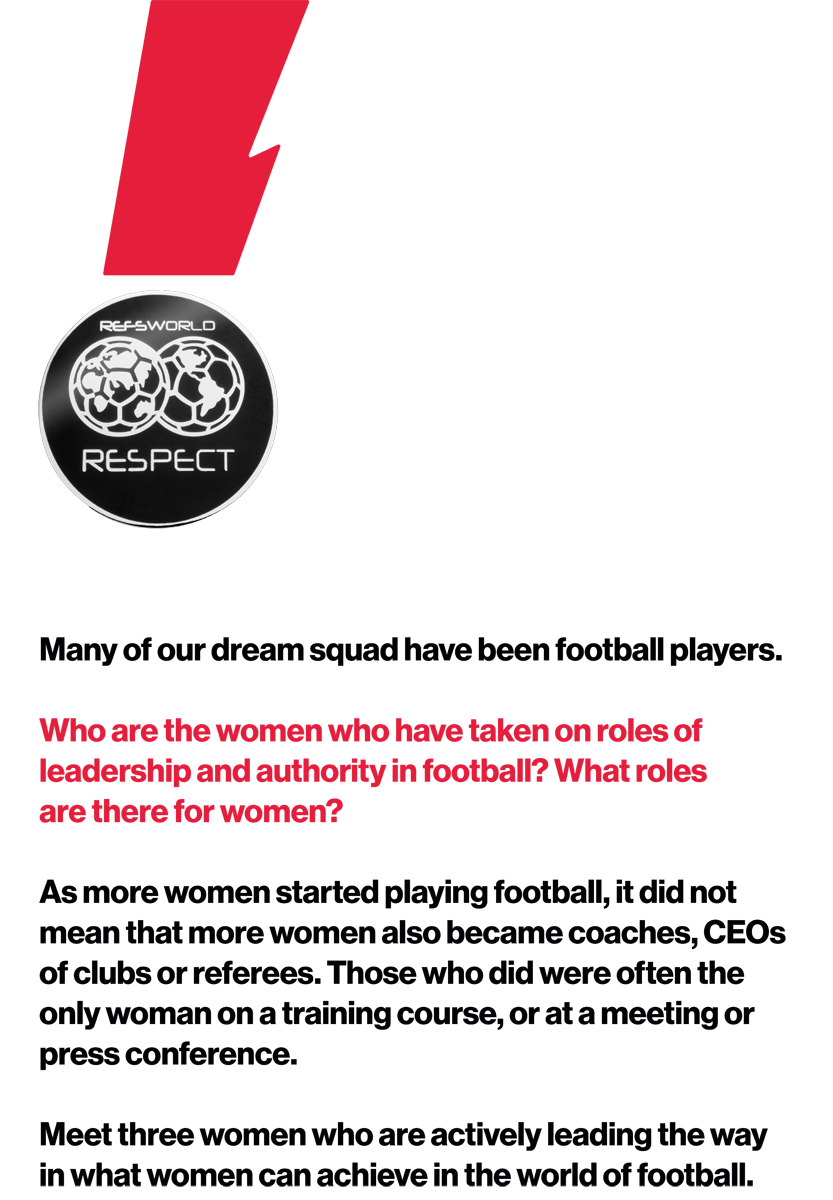
Text panel audio: Nevertheless she Persisted
Many of our dream squad have been football players.
Who are the women who have taken on roles of leadership and authority in football? What roles are there for women?
As more women started playing football, it did not mean that more women also became coaches, CEOs of clubs or referees. Those who did were often the only woman on a training course, or at a meeting or press conference.
Meet three women who are actively leading the way in what women can achieve in the world of football.

Text panel audio: The Personal is Political
The final three members of our dream squad are players whose love of football has led to them being activists for change.
Football is one of the most popular sports in the world. It is played on street corners, playgrounds and fields, and in huge stadiums in front of thousands of people. It is a universal language.
When those who play use their voice to fight for something they believe in, it can be controversial and divisive. Sometimes they are told to keep their opinions in the locker room. But we expect our footballers to be role models.
What does it mean to be a role model?
For many it means fighting for the right to simply play football, when you are told there is no place for you on the field. For others it means using your privilege to take a stand and speak out. To say, let’s make the world a kinder, more accepting place, on and off the pitch.

